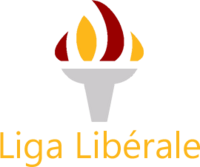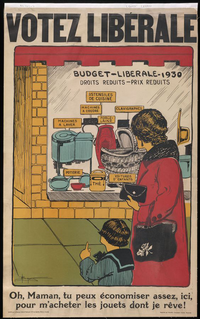Liberal League
Liberal League Liga Libérale | |
|---|---|
 | |
| Leader | Jacques Magule |
| Deputy Leader | Bernada Barri |
| Founder | Andreu Pallarès Boniface Besnard |
| Founded | 11 October 1871 |
| Preceded by | Chartist Party |
| Headquarters | Fidancia, Lotrič |
| Ideology | Liberalism Social liberalism |
| Political position | Centre |
| International affiliation | Liberal International |
| Parliamentary Bloc | Reform |
| Colours | Amber |
| Public Assembly | 27 / 572
|
| Senate | 19 / 300
|
| Election symbol | |
| LL | |
The Liberal League (Midrasian: Liga Libérale) is a liberal political party operating within Midrasia. The party was a successor to the now defunct Chartist party, formed after the Crisis of 1871 by the newly emerging social liberals. The party's formation as a merger of associated Liberal groups led to a number of political defectors from the Chartist Party and Radical Party. Throughout the twentieth century the Liberal League has been a considerable force within the Reform Bloc, especially between 1900 and 1916, though declined considerably in the following years owing to the rise of the PSD. Although the Liberals have not been able to recover to their original level of success, in recent years the party has gone from strength to strength, securing a sizeable presence within both the Public Assembly and Senate.
As of the 2019 election the Liberal League holds 27 seats within the Public Assembly and 19 seats in the Senate. The party also holds a number of major positions within the Council of State, with party leader Jacques Magule holding the position of Vice-Consul and Matthieu Marais holding the role of Foreign Secretary.
History
Chartism
Midrasian liberalism can be seen to have its origins in the Chartist movement on the late eighteenth and nineteenth century. Chartists were individuals who supported the creation of a constitutional charter to limit the power of the Midrasian Consul and codify a set of rights to be enjoyed by the subjects of the Midrasian Republic. The Chartist movement played an integral role in the outbreak of the Midrasian Revolution and the creation of the modern democratic republic enjoyed today. The Chartists were opposed to the Conservatives who supported a strong consulship, and a major role for the Alydian church in the country's politics. The exclusion of Chartists from the national convention of 1786 by Jean-Jacques Devreux resulted in the outbreak of the revolution.
Chartists such as Henri de Châtelier were integral in drafting the post-revolution Constitution in 1791 and the institution of liberal democracy throughout the country. In the decades following the revolution, Chartists worked to advocate for a stronger Midrasian parliament with an emphasis on individual rights and liberties for citizens.
Chartist Party
In 1791 the Chartist Party was officially formed. However, for the majority of its tenure, the party was regarded as classical liberal, advocating for limited state involvement in both social and economic policy. The Liberals mostly pushed for greater free-trade in contrast to the protectionist policy pushed by the Conservatives. Additionally, the party had also moved away from secularisation to pro-Alydian stances. Whilst the Conservative party mostly received the backing of the aristocratic elite, the Liberal party was seen as the party of the middle classes and bourgeoisie. However, with the Conservative party's commitment to universal male suffrage in the 1860s, the Liberal party began to adopt more moderate stances, emphasising reform within the Midrasian political sphere and greater political and personal freedoms.
However, with the Crisis of 1871 the Chartist Party splintered with the classical liberal contingent joining the newly formed Republican Party and many social liberals joining the Radical Party. In late 1871 however, disaffected social liberals formed the Liberal League as a new party to contest the 1872 elections where they won 39 seats.
Liberal League
The Liberal League was able to establish itself as a considerable political force during the latter stages of the nineteenth century, entering a coalition with the Radicals in 1880. However, following the conclusion of the Great War the party was swept to power in 1900 with Jean-Paul Birou elected as Consul to consecutive terms. Under Birou the party pushed through a number of reforms developing the beginnings of the welfare state, and introducing political reform to bring stability to parliament with the introduction of the political bloc system which remains in use today. The party regained the Consulship in 1912 under Henri de Riquarde, though soon came to lose out to the rising Social Democratic Party which came to dominate the Reform Bloc.
It wasn't until the 1990s that the party experienced a period of significant growth, as an increasing number of dissatisfied Republican Party voters turned to the Liberals due to the Alydian Democrats more conservative social policies. At the 1990 election, the party was able to reach a total of 12 seats and nearly doubled its total only four years later. This period, categorised by political historians as the Liberal resurgence saw the Liberal League emerge as a significant force in Midrasian politics. The rise of the Liberal League has been identified by historians as a driving factor behind the PSD's attempts at parliamentary reform and the UDA's shift toward a more liberal attitude in social policy under the leadership of Mylos Ranieri. By 2009 the Liberal League found itself with 56 seats in the Public Assembly, far and away the third largest party in Midrasian politics and by 2013 the party was able to secure 79 seats. This newfound status not only allowed the Liberal League to pose a significant threat to the two established mainstream parties but also saw the party take up a major role in the Vauban cabinet.
Vauban government
With the Liberal League holding 79 seats within the Public Assembly, the party were able to have significant influence within the Vauban government of 2013-2017. Party leader Jacques Magule specifically stated the government was a 'partnership of equals', with both the PSD and Liberals contributing significantly to the government's legislative agenda. The new centrist outlook of the PSD has been highlighted as the reason for the successful nature of the coalition, however a number of more left-leaning members of the PSD have been notably critical of the government and the PSD for giving-in too easily to the demands and agendas of the Liberals. Despite this, the Liberals were required to accede to the demands of the PSD in a number of areas, particularly in terms of taxation, unemployment benefits and the continued policy of public ownership of the Relier network.
The coalition itself had been considerably successful for the Liberal League, however the publication of allegations of corruption aimed at Charles Vauban tarnished the reputation of the party. Though the Liberals withdrew their support for Vauban in February of 2017 after the official investigation into the Consul was announced, they were unable to improve their falling poll rating. The party broke with the PSD in voting for the investigation however, stated that they had no knowledge of any of the Consuls alleged misdemeanours from his time in government.
Post-2017
Following the 2017 Midrasian elections, the Liberal League lost 38 seats, primarily due to the party's connections to Vauban and the emergence of the Progressive Alliance. The party still maintains a large role in the Council of State, though not to the extent of the Vauban government. Political scientists have suggested that the party faces an uncertain future due to its inability to differentiate itself from the Progressives. Many have speculated that the Liberal League may split with members defecting to both the PSD and AP if it is unable to prevent further losses in upcoming elections. This fear was re-affirmed during the 2019 mid-terms when the party fell to 27 seats, a net loss of 14 seats.
Ideology
The Liberal League identifies as a liberal political party, emphasising a broad consensus within its policies between the more classical liberal members of its party and those who advocate social liberalism. In spite of this, the party as a whole has a tendency to favour greater government intervention in both economic and social matters.
The party's platform as outlined in their 2017 manifesto is as follows:
- Introduction of a windfall tax on excessive profits
- Overhaul of the country's benefits system to focus on education and re-integration
- Reform of the 40% tax rate to create a more progressive taxation system
- Introduction of 'free schools'
- Legalisation of same-sex marriage
- Creation of a proportional voting system for the Senate
- Devolution of further powers to local authorities
- Constitutional reform to increase oversight on the role of Consul
- Promotion a more ethical and cooperative foreign policy for Midrasia
Electoral performance
Parliament
| Election year | Public Assembly | Government | |||
|---|---|---|---|---|---|
| # of overall votes |
% of overall vote |
# of overall seats won |
+/– | ||
| 2013 | 11,024,225 | 13.8 % | 79 / 572
|
in coalition | |
| 2017 | 4,770,655 | 7.2 % | 41 / 572
|
in coalition | |
Asuran Parliament
| Election year | # of overall votes |
% of overall vote |
# of overall seats won |
+/– |
|---|---|---|---|---|
| 2016 | 6,551,076 | 40.9 % | 45 / 110
|

